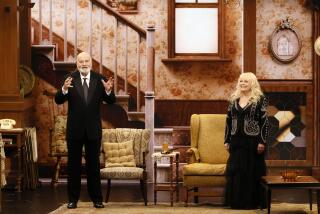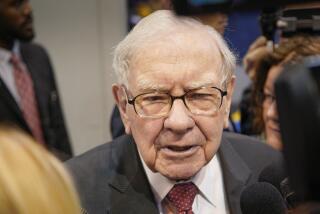Creative, Caring Employers Join Lear’s Award-Winning Family
- Share via
TV producer Norman (“All in the Family”) Lear has danced on the entertainment high wire more than a few times. And he has ample rewards to show for his risk taking.
At 74, Lear is in the business these days of rewarding companies that dare to be different in the corporate realm. His Business Enterprise Trust, founded in 1989 in Stanford, Calif., seeks out companies that do good things for their employees and, by so doing, boost their own bottom lines.
On Tuesday in New York, President Clinton is slated to be the keynote speaker as the trust presents its 1996 awards to individuals and companies demonstrating courage, vision and integrity.
“The corporate climate is generally judged to be cold to the worker,” Lear said in an interview. “Here are some terrific examples of the opposite.”
* McKay Nursery Co. This retailer and wholesaler of ornamental trees and shrubs, based near Madison, Wis., in the town of Waterloo, is noteworthy for a number of innovative strategies relating to its employee stock ownership plan. Since its founding a century ago, the company has viewed its goal as “creating success for lots of people,” said President Griff Mason.
In the 1960s, McKay realized that competition was fierce for the limited pool of migrant workers from Texas and elsewhere who made their way north to help with seasonal farming. So the company began treating them with respect, providing exemplary living and working conditions.
Under its ESOP, McKay extends ownership stakes to migrant workers, just as it does to full-time, year-round employees. In addition, the company offers profit sharing and bonuses to all employees. As a result, 90% of the seasonal workers return annually.
The company feels strongly that the loyalty of its work force has been key to achieving a string of record sales and earnings.
* Donna Klein and Marriott International Inc. Faced with daunting rates of turnover, absenteeism and tardiness among lower-wage workers, who constitute more than 75% of its 180,000 employees, Marriott developed a confidential, 24-hour hotline to provide counseling on personal problems.
The Associate Resource Line was the brainchild of Klein, director of the hotel company’s work/life programs, and the Partnership Group, a work/life consulting firm in Philadelphia. Last year, in the program’s first full year, more than 3,000 workers tapped the service, asking trained counselors’ advice on immigration problems, school and parenting troubles, domestic violence and substance abuse.
“This is part of our holistic approach to supporting employees’ personal lives,” Klein said from her office in Bethesda, Md.
Turnover has plummeted to 50% a year, half the industry’s typical level. About 10% of those using the service said they would have resigned without the help. Workers report that they feel less stressed and more positive toward Marriott.
* Motorola Inc. At a time when cost cutting reigns in its ultra-competitive industries, the Schaumburg, Ill., maker of cellular phones and pagers continues to invest heavily in training. In 1995, it spent $200 million to upgrade the skills of its 140,000 employees. That amount represented 3% of the company’s total payroll budget and three times the average invested by American industry. Motorola says it reaps $30 in productivity gains for every dollar spent on training.
Every employee must complete at least 40 hours of course work annually, with some workers in highly competitive areas needing as much as 700 hours.
* Yla Eason. Eason, who holds an MBA from Harvard, was spurred in 1985 to start a company to develop “ethnically correct” toys because of her inability to find an African American action figure for her young son. Her Olmec Toys in Richmond, Va., has helped persuade big retailers to embrace the marketing potential of multicultural toys.
* Receiving the lifetime achievement award will be Max De Pree, 72, retired chief executive of Herman Miller Inc., a furniture maker based in Zeeland, Mich. As CEO, De Pree instituted work teams and a stock-based profit-sharing program. He is also a best-selling author of books about leadership.
Since the Business Enterprise Trust began spotlighting socially responsible companies, it has also produced short documentaries about award recipients that it has contributed to more than 450 business schools nationwide. With a $1.1-million grant from the Ford Foundation, to be announced along with the winners on Tuesday, the trust plans this year to assess the effectiveness of its programs. That evaluation will postpone the 1997 awards until the fall of 1998.
More to Read
Inside the business of entertainment
The Wide Shot brings you news, analysis and insights on everything from streaming wars to production — and what it all means for the future.
You may occasionally receive promotional content from the Los Angeles Times.











